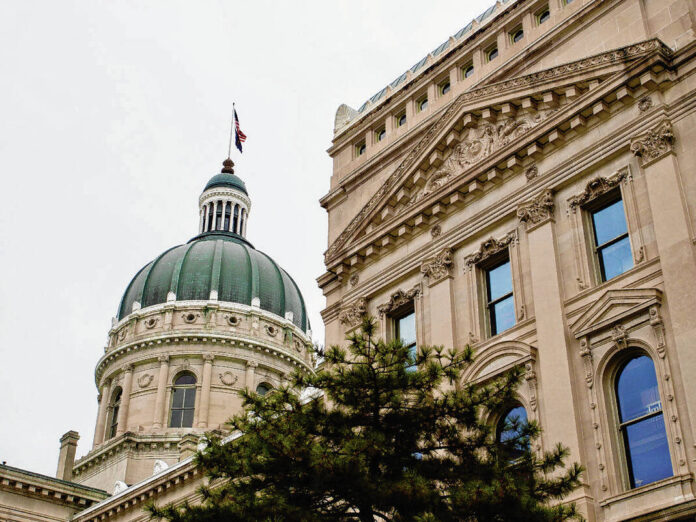Going into the 2023 legislative session, it was clear that health care costs would top the list of priorities for the General Assembly but the anti-transgender health care bill for minors appears to be overshadowing those efforts.
While lawmakers have filed dozens of bills aiming to reduce health care costs — ranging from reforming prior authorizations and prescription rebates to expanding mental health care and more — none have attracted the same attention as the slew of bills aimed at LGBTQ youth, specifically transgender minors.
Critics point to the small number of youth impacted by these bills. Nearly 1.6 million Hoosiers are under the age of 18 and roughly 1,000 of those — 0.0006% — sought treatment at the Riley Children’s Hospital Gender Health Program.
Additionally, few of those 1,000 children are receiving the puberty blockers and hormone therapies banned until Senate Bill 480. Similar anti-transgender efforts are likewise advancing in the Statehouse.

The bill is up for a full vote in the Indiana House today.
“We should be sitting here talking about issues like how we’re going to make sure these kids have an education for the 21st century,” Senate Minority Leader Sen. Greg Taylor said. “But instead, we’re talking about whether or not someone should be able to be referred to as him, her or they? To me, it’s a bad policy decision and unfortunately the citizens of Indiana are going to pay for it.”
Health care bills taking back seat?
When asked whether the bill barring transgender health care for minors would overshadow other health care bills, House Speaker Todd Huston simply said, “No,” and didn’t expand.
But testimony and reader reactions tell a different story.
Last week, lawmakers heard testimony on both Senate Bill 480 and Senate Bill 8 — on Tuesday and Wednesday, respectively.
Roughly 50 Hoosiers testified publicly on Senate Bill 480 and dozens more chanted outside throughout the duration of the committee. Lawmakers took just over four hours on the bill despite limiting public input to three minutes.
Whereas Senate Bill 8, a niche bill that would mandate pharmacy benefit managers pass along rebates to patients, attracted roughly two dozen people, five of whom testified for about 90 minutes.
Within 48 hours after the Indiana Capital Chronicle tweeted the news about the transgender health care ban passing committee, it had reached 48,000 people. Similar tweets on four other health care bills — all of which were Republican caucus priorities and advanced in either late January or February — reached a combined 2,723 Twitter users.
To Ball State University economist Mike Hicks, whose research frequently targets Indiana’s high health care prices, the focus takes away from the bills that could have a greater impact.
“If you’re spending your time trying to understand the transgender bill — that naturally is going to have people yelling at you at home and at your Lincoln Day dinners — you don’t have time to understand the other bills,” Hicks said. “The problem is that the bill affects very few people but it’s animating people’s concerns about what the legislature is doing while the hospital bill affects about 6.5 million Hoosiers.”
The hospital bill Hicks named, House Bill 1004, initially sought to fine hospitals whose services cost 260% of the federal Medicare reimbursement rate but now pushes for the Department of Insurance to calculate a national mean price as a percentage of Medicare.
The first version could have had an immediate impact on the health care costs of Hoosiers, Hicks said, while the weaker version just pushes reform efforts further into the future.
The original version of House Bill 1004 “would be a very effective mechanism for restraining monopoly prices for Medicare services,” Hicks said. “But the opportunity cost of fighting the culture wars is you don’t get anything important done.”
But even Hicks, who has repeatedly criticized the state’s health care system monopolies, said the legislature was limited in its power.
“(Monopolies) own clinics, they own all of the hospitals in a region. The idea that the legislature can step in and sort of completely dismantle that … is more hope than anything else,” Hicks said.
Intense scrutiny of transgender Hoosiers
Despite public attention disproportionately focusing on anti-transgender bills, including a

combined seven hours of testimony on a pronouns bill, Senate President Pro Tem Rodric Bray insisted that Hoosiers would remember the chamber’s other priorities.
“Sure it makes a lot of noise, but it is not even close to (being) as substantive as some of the health care things that we’re working on now,” Bray, R-Martinsville, said.
His Democratic counterpart, Taylor, disagreed about those efforts, specifically naming a bill that bars the Department of Corrections (DOC) from spending funds on gender reassignment surgeries.
“We used to have the value that the government stayed out of people’s households but we’re seeing a lot of ideology being passed over here in the General Assembly and it’s taken up a lot of time,” Taylor said. “We had a public policy debate about whether or not we believe that (DOC) should be able to facilitate someone having gender-affirmation procedures. We’ve had two cases in the entire state and it’s like the sky is falling.”
Even Gov. Eric Holcomb, in a media availability on March 17, highlighted efforts outside of the legislature’s culture war bills he wanted to focus on, some of which had died.
“A number of these bills aren’t part of my agenda,” Holcomb said about anti-transgender bills. “In general, parents not only have a right to their children’s health and well-being, they in fact have the responsibility of it.”
Examples of priority bills that would have a larger impact on the lives of all Hoosiers include plans to expand mental health services and funding public health at the national average — the latter of which is one of Holcomb’s goals, though the legislature has been reluctant to pay the price.
This story by Whitney Downard is republished from indianacapitalchronicle.com, an independent, not-for-profit news organization that covers state government, policy and elections.





